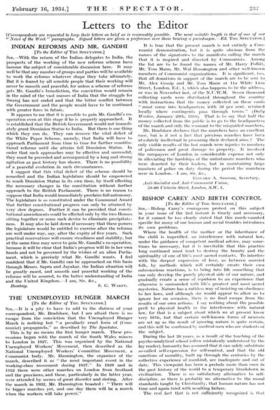Letters to the Editor
irorrespandents are requested to keep their letters as brief as is reasonably possible. The most suitable length is that of one of our "News of the Week" paragraphs. Signed letters are given a preference over those bearing a pseudonym.—Ed. THE SPECTATOR.]
INDIAN REFORMS AND MR. GANDHI
[To the Editor of THE SPECTATOR.]
§m,—With the return of the Indian delegates to India, the prospects of the working of the new reforms scheme have become the subject of considerable discussion here. It may well be that any number of groups and parties will be available to work the reforms whatever shape they take ultimately. But it is feared by all sensible people that their working will never be smooth and peaceful, for unless a scheme of reforms gets Mr. Gandhi's benediction, the conviction would remain in the mind of the vast masses of India that the struggle for Swaraj has not ended and that the bitter conflict between the Government and the people would have to be continued with greater force in future.
It appears to me that it is possible to gain Mr. Gandhi's co- operation even at this stage if he is properly approached. It is established that the British Government would not immedi- ately grant Dominion Status to India. But there is one thing which they can do. They can remove the vital defect of the White Paper Scheme, namely, that India will have to approach Parliament from time to time for further constitu- tional reforms until she attains full Dominion Status. In order that such approaches may be effective and successful, they must be preceded and accompanied by a long and strong agitation as past history has shown. There is no possibility of a peaceful evolution in such circumstances.
• I suggest that this vital defect of the scheme should be remedied and the Indian legislature should be empowered to reach Dominion Status in its own time, by itself effecting the necessary changes in the constitution without further approach to the British Parliament. There is no reason to suppose that India would immediately proclaim full autonomy. The legislature is so constituted under the Communal Award that further constitutional progress can only be attained by very slow degrees. Further it can be provided that consti- tutional amendments could be effected only by the two Houses sitting together or some such device to eliminate precipitate- ness. It may also be laid down if necessary that these powers the legislature would be entitled to exercise after the reforms are well under way, say, after the expiry of five years. Such practical reservations will ensure steadiness and stability, but at the same time may serve to gain Mr. Gandhi's co-operation, because it will be clear that India's progress will lie in her own hands and not be governed by the wishes of an alien Parlia- ment, which is precisely what Mr. Gandhi wants. I feel confident that if Mr. Gandhi. can be approached on this basis through Messrs. Sapru and Jayakar, the Indian situation will be greatly eased, and smooth and peaceful working of the reforms will be assured, to the better understanding of India and the United Kingdom.—! am, Sir, &c.,








































 Previous page
Previous page